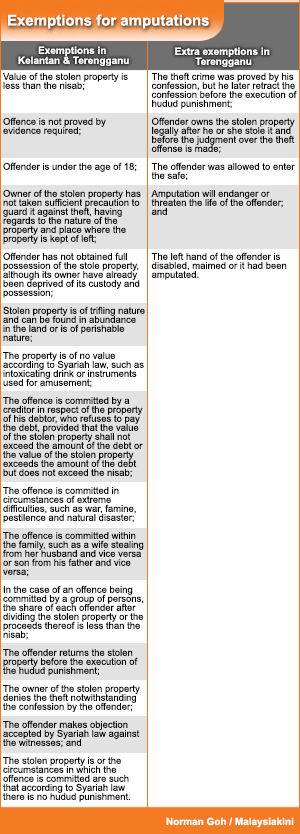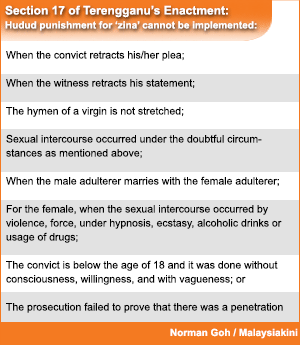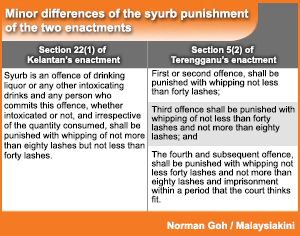PAS' latest move to table a Private Member’s Bill to seek the ‘green light’ for the Kelantan Syariah Criminal Code (II) Enactment 1993 to take effect has once again stirred a hornet's nest in the Malaysian political arena.
The issue of hudud law is not a new topic per se. Since the PAS-dominant Kelantan state assembly passed the enactment and subsequently and did the same with the Terengganu Syariah Criminal Offense (Hudud and Qisas) Enactment 2003 when they occupied the latter's state government in 1999, the issue has been used by both sides of the political divide to attack each other.
Despite the many controversies raised and despite PAS today saying they have decided not to go ahead with the Bill in light of a new technical committee on the matter, the general public has seldom had the chance to scrutinise the two controversial enactments.
Malaysiakini has sifted out the salient points over the two enactments in hope of demystifying them.
Since PAS is the hand behind the two enactments, the majority of the contents is the same and both state that they are only applicable to Muslims in the respective states.
But they also state that non-Muslims cannot be precluded from electing these enactments to be applied to them in respect of any offence committed by them within the state.
 However, when read closely, there are differences between the two states' enactments in terms of definition of crimes and the exemptions.
However, when read closely, there are differences between the two states' enactments in terms of definition of crimes and the exemptions.
The most evident is the way they deal with rape.
The Terengganu enactment has provisions to prevent a female who has been raped from being punished under zina (unlawful carnal intercourse), It has removed the requirement to provide four male Muslims as witnesses should there be sufficient evidence.
Kelantan's enactment however does not have such clear provisions on this matter.
Elaborate punishment systems
Offences defined under hudud are only part of the enactments, which also involve qisas and ta’zir offences.
Offences to which qisas apply are defined by the Quran and the Sunnah, and are referred to as qisas offences, and their punishments as qisas punishments.
Offences which are neither hudud nor qisas are left to the discretion of the legislature or, according to the enactments, to the discretion of the court. Such offences are referred to as ta’zir offences, and their punishments as ta’zir punishments.
The ta’zir punishments are provided for where a hudud or a qisas offence cannot be punished with its respective punishments because it cannot fulfil the conditions required.
There are six hudud offences: sariqah (theft), hirabah (robbery), zina, qazaf (accusation of zina which cannot be proved by four witnesses), syurb (consuming liquor or intoxicants), and irtadad or riddad (apostasy).
Both enactments provide the same punishment against zina:
- Whoever commits the offence of zina, should he or she be married and has experienced sexual intercourse in such a marriage, shall be punished with the punishment of rejam (stoning to death with stones of medium size).
- Whoever commits the offence of zina, whether he or she is married but has not experienced sexual intercourse in such a marriage, shall be punished with the punishment of whipping of one hundred lashes in addition to one year imprisonment.
- Whoever commits qazaf shall be punished with 80 lashes of whipping and his testimony shall no longer be accepted until he repents.
Both enactments have provided an exemption for the zina punishment:
- In doubtful circumstances in which the man thought the woman with whom he had sexual intercourse was his wife, when in fact she was not; or
- In doubtful circumstances in which he believed that his marriage to the woman with whom he had sexual intercourse was valid according to Syariah law, when in fact his marriage to her was invalid.
More exemptions
 However, section 17 of the Terengganu enactment provides seven additional exemptions; one of them for where the female proves that she was forced to undergo sexual intercourse by way of violence or the use of drugs.
However, section 17 of the Terengganu enactment provides seven additional exemptions; one of them for where the female proves that she was forced to undergo sexual intercourse by way of violence or the use of drugs.
Section 9(1) of the Terengganu’s enactment states that whoever claims of being raped but is unable to provide evidence required under the Syariah law to support her claim, has committed the offence of zina.
However, section 9(2) of the same enactment also states that if she can support her claim with enough qarinah (evidence) without fulfilling the requirement of four male Muslim witnesses, then investigation must be carried out.
Once this is proven, the offender is punished under ta’zir punishment.
Both enactments prohibit sodomy and the punishment and method of proof are as with zina.
There are extra provisions under Kelantan’s enactment to ban sexual activities between females, with animals as well as necrophilia.
Section 19(1) of the enactment criminalises sexual gratification between females and the punishment is at the discretion of the court.
Section 20 deals with necrophilia and Section 21 with bestiality, both to receive ta’zir punishment of imprisonment not exceeding five years.
At the same time, both enactments have the same punishments for theft: for the first offence with amputation of the right hand; a second offence with amputation of part of the left foot; for the third and subsequent offences with imprisonment.
In the table below are the exemptions for amputation for the two enactments.
The definition for ‘rizab’ in both enactments are the same: a sum of money equivalent to the prevailing price of 4.45 grams of gold; subject to review by the sultan according to Syariah law.
Both enactments state that one must face qisas punishment and pay an amount of ‘diyat’ should he or she kill or injure somebody.
Both enactments punish murder with death or life imprisonment.
Nevertheless, the relatives of the victim can choose to pardon the offender before the execution of the qisas punishment and to ask for a sum of ‘diyat’ to compensate the punishment.
Intentionally causing death is punished by payment ‘diyat’ to the victim’s relatives and in addition be punished with the ta’zir punishment of imprisonment for a term not exceeding 14 years.
In case of unintentionally causing death, the jail term is limited to 10 years
The difference in the two states is the definition of ‘diyat’, where in Kelantan it is defined by the prevailing price of 4,450 grams of gold while in Terengganu it is the 100 camels, subject to the sultan's review.
Death and crucifixion
For robbery both enactments provide the same punishments.
Should the robbery result in death and stolen property, the offender will be punished with the hudud punishment of death and thereafter crucified. If no property is stolen, crucifixion is spared.
If in a successful robbery the victim is not harmed, amputation of right hand and left foot will be executed. Threat of robbery is also punishable by imprisonment.
However, according to Section 24(2)(a) of the Terengganu’s enactment, the offender can be spared hudud punishment if he has "cleansed the heart from sin before the legal proceeding, and had declared regret in front of the judges and return the robbed property before the victim".
Section 24(2)(b) also exempts one from hudud punishment if one voluntarily surrenders before the legal proceeding takes place.
 There are minor differences of the syurb (intoxication) punishment of the two enactments.
There are minor differences of the syurb (intoxication) punishment of the two enactments.
Both enactments have the same punishment over apostasy, which is death sentence and forfeiture of property.
Know your amputations
Both enactments share the same definitions of the amputations for which hudud is most notorious in public debate.
Amputation of the hand is conducted at the wrist.
Amputation of a foot involves the middle of the foot in such a way that the heel may still be usable for walking and standing.
Meanwhile for whipping, the rattan used is defined as one metre long and one centimetre in diameter.
Moderate force is required so that the officer administering the punishment shall not raise the rattan whip above his head and such whipping shall be given consecutively.
The offender is in standing position and clothed in thin clothing covering the ‘aurat’.
The strokes shall be well distributed on all parts of the body except the face, head, chest and private parts.
An offender who is pregnant is to have the stoning and whipping punishment deferred until after delivery of the baby or the completion of breastfeeding.

